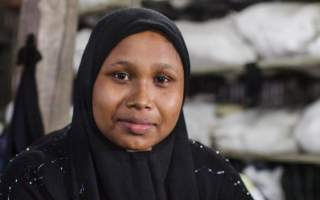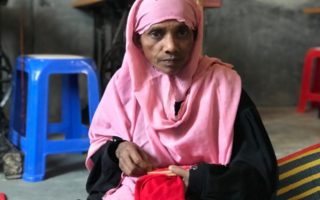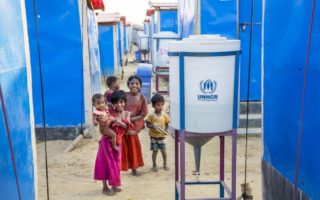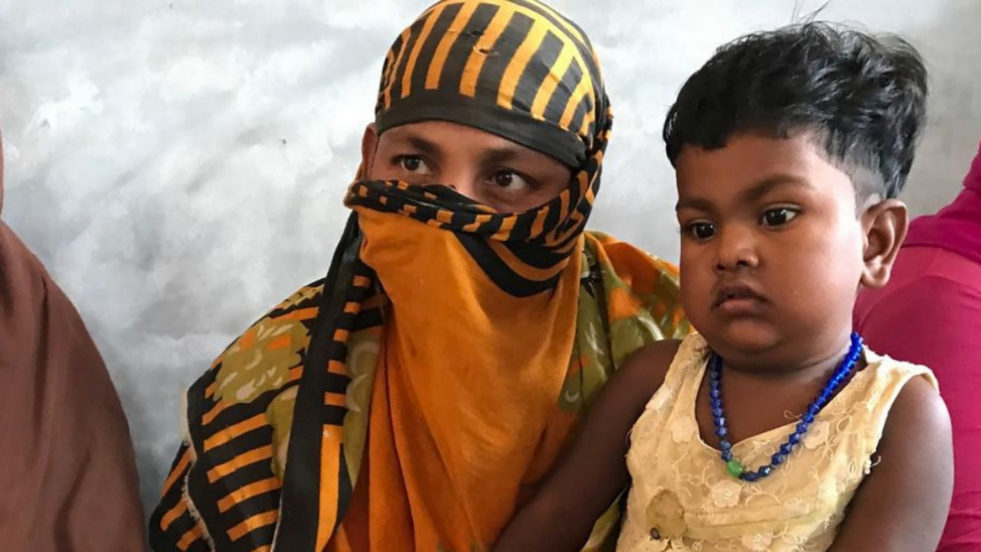
Rohingya refugee Mushida holds her daughter Sharmin while learning to embroider in Kutupalong refugee camp. © UNHCR/Caroline Gluck
A skills programme promotes self-reliance and aims to transform the lives of rural women in south-eastern Bangladesh.
By Caroline Gluck in Ukhiya and Kutupalong, Bangladesh
In a bamboo thatched women’s centre in Kutupalong, more than a dozen Rohingya refugees are sitting closely together on mats and concentrating so fiercely on their sewing that barely a sound can be heard.
Only the encouraging murmurs of a trainer who checks on their progress break the silence of the focused women.
They are mainly widows or other women heading their households alone. Ranging in age from 18 to 40, most had never learned how to sew before. After just a few weeks participating in an innovative training programme, they are now working on delicate embroidery for flower designs, using a mix of different stitches and colourful threads.
Twenty-six-year-old Mushida, whose two year-old daughter, Sharmin, curiously watches her at work, has longed for such an opportunity: “My husband is not able to find any way to earn money here and we have many problems.”
“I’m very happy to be part of this,” she adds. “I am more confident that we will have a better future.”
“I can improve my skills, earn and provide a stable income for my family.”
The skills training programme grew out of a partnership between UNHCR, the UN Refugee Agency, and the Ayesha Abed Foundation, the humanitarian arm of BRAC, the world’s largest non-governmental organization. It supports Rohingya refugees who fled violence in Myanmar as well as Bangladeshi women in the rural areas hosting them. The hope is that they can all become more self-reliant through craft production.
Also taking part in the project is Gulbahar, a 40-year-old Rohingya widow with two children. “Before this project, I planted some vegetables around our shelter, like onions, that helped me feed the family,” she says. “Life was a struggle. I didn’t have much hope.” The skills training helped Gulbahar gain confidence in herself and the future.
At small centres in the refugee settlements, Rohingya women embroider pieces by hand, while at the main production centre in Ukhiya Bangladeshi women sew children’s, women’s and men’s wear, as well as household items. The women receive a small stipend during the six-month training period.
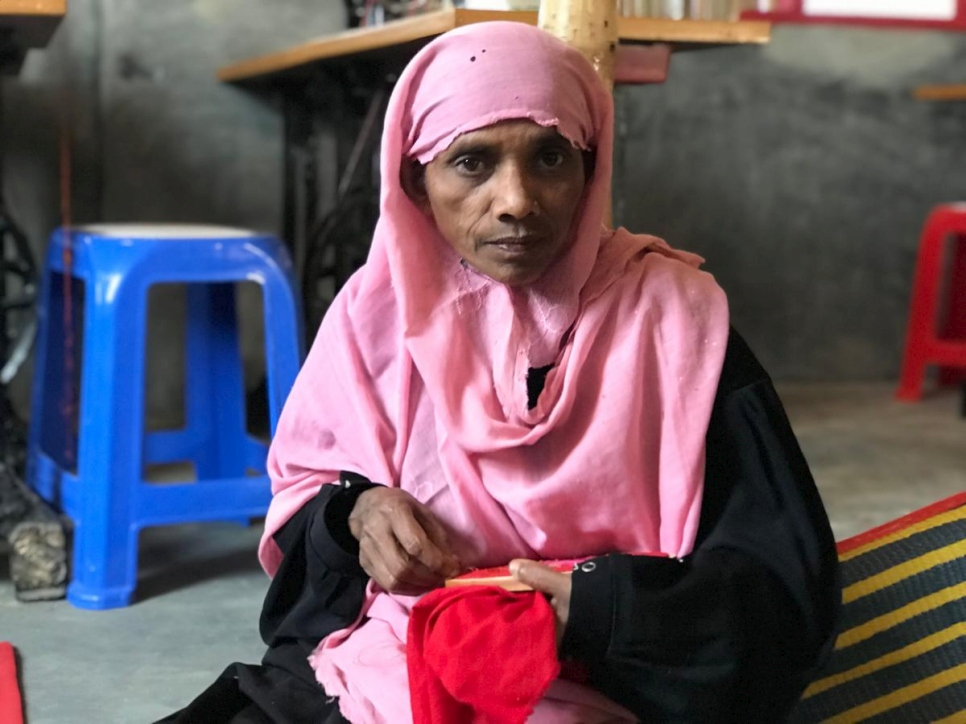
Gulbahar, a 40-year-old widow and mother of two, learns to embroider at a women’s centre in Kutupalong refugee camp in Bangladesh. © UNHCR/Caroline Gluck
The finished products will be sold in one of Bangladesh’s best known retail outlets, Aarong, a social enterprise BRAC launched 40 years ago. Aarong provides a source of income for rural women, with more than 21 retail outlets throughout the country and a successful online retail presence.
“The project supports both the host community and Rohingya women and links them up to the consumer market,” says Subrata Kumar Chakrabarty, a UNHCR livelihood officer based in Cox’s Bazar. “This is a good example of a win-win situation for the host community and the Rohingya women.”
At the main centre in Ukhiya, a newly refurbished building, rows of Bangladeshi women are busy at sewing machines, working on women’s tunics. In another room, trainees are learning the skills for woodblock printing and silk-screen printing.
“This is a good example of a win-win situation for the host community and the Rohingya women.”
The centre is well-equipped, the atmosphere serious and briskly efficient. Milon Kumar Karmaker, a project manager with the Ayesha Abed Foundation, says the programme aims to support rural women and refugees who are struggling to get by in an area with few other opportunities.
“This region is one of the poorest in Bangladesh. The income generated by their husbands isn’t enough for their families, and there are few employment opportunities for women,” he says.
For Renumaru Begum, 29, it has been a daily struggle to support her two daughters. She is the family’s sole breadwinner, and says the programme is a lifeline.
“My husband isn’t with us, so I have to work and take care of my two children and it’s very important for me to find an income,” she says. “There are costs I have to pay in sending them to school.”
She used to make some money sewing from home, but only managed to get a few orders. “I’m very happy to find this opportunity,” she says. “It makes my struggles easier. I can improve my skills, earn and provide a stable income for my family.”
After completing the six-month training, Ranumaru hopes to get a permanent job that will allow her to properly sustain her family.
Eighteen smaller sub-centres are being opened up in other areas of Cox’s Bazar as well as in the refugee camps.
By the end of the first year, the goal is to train 500 women, half of whom will be refugees. If the project succeeds, the hope is to train hundreds more.
Originally published by UNHCR on 16 April 2019



